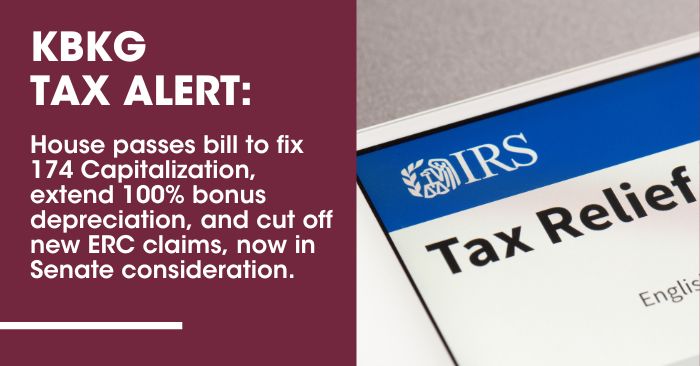KBKG Tax Alert: House passes proposed bill to Fix 174 Capitalization, Extend 100% bonus depreciation, and Cut Off New ERC Claims, now in Senate consideration.
Proposal Aims to Boost Businesses with Immediate Deductions for Domestic Research and Experimental (R&E) Expenditures and Capital Investments on qualified property while reining in the Employee Retention Credit (ERC).
The bipartisan proposal deemed “The Tax Relief for American Families and Workers Act of 2024” (The Act) was successfully voted to pass by the House of Representatives on January 31, 2024. The diligence exhibited during the House proceedings has positioned The Act well for the next phase of the legislative process, in which the bill will be presented to the Senate.
“I typically do not like to speculate, but this bill has real promise to pass.” stated Gian Pazzia, CEO of KBKG.
The proposal outlines significant changes to the tax treatment of R&E expenditures, extends the benefits of 100% bonus deprecation retroactively through January 1, 2026, and addresses Employee Retention Credits.
Research and Experimental (R&E) Investments:
Under the proposed changes, businesses of all sizes would be able to immediately deduct the total cost of their domestic R&E expenditures rather than amortizing the expenditures over a five-year period.
The law currently mandates domestic R&E expenditures incurred after December 31, 2021, to be capitalized and amortized over a five-year period. However, the Act would delay the implementation of this requirement until taxable years beginning after December 31, 2025. This delay would enable taxpayers to immediately deduct domestic R&E expenditures incurred after December 31, 2021, and before January 1, 2026. As approved, foreign R & E expenditure will still be required to be capitalized and amortized over a 15-year period.
Bonus Depreciation on Capital Expenditures and Cost Segregation:
The Act will extend 100% bonus depreciation for qualified property placed in service after December 31, 2022, and before January 1, 2026 (2027 for longer production period property and specific aircraft). The Act retains 20% bonus depreciation for qualified property placed in service in 2026 and phases out after that.
KBKG Insight: Remember, a cost segregation study identifies “qualified property” for bonus depreciation purposes. Building components that are normally segregated and depreciated over a 5, 7, and 15-year life are eligible for bonus depreciation if placed in service during the eligibility periods.
Employee Retention Credit (ERC) Impact:
As part of this proposed bill, Congress plans to terminate the ERC program, barring any additional claims after January 31, 2024. This date would be a significant change from the current filing deadlines of April 15, 2024, and April 15, 2025, for 2020 and 2021 ERC claims, respectively. While the Senate will only consider the final bill or sign it into law after January 31, the new ERC end date can be made effective retroactively. KBKG will monitor this date and any news regarding the IRS’ current moratorium on processing new ERC claims since September 2023.
The proposed bill also includes several other provisions related to the rampant fraud within the ERC program, including additional penalties for preparers of fraudulent claims and new disclosure requirements for a newly defined category of “COVID-ERTC Promoters.”
Finally, the proposed bill extends the statute for IRS assessments of ERC from five years to six years and also extends the period for taxpayers with disallowed ERC claims to re-claim deductions for wages (related to the wage deduction disallowance associated with ERC claims via amended returns).
As we transition to the Senate proceedings, we remain optimistic about the positive outcomes The Act can bring to foster a more innovative and competitive business environment in the U.S., benefiting businesses and the economy. KBKG’s goal is to help CPAs, as tax professionals, stay informed of these potential modifications, provide accurate advice to clients, ensure compliance with the evolving tax landscape, and prepare for forthcoming proposed rule changes. We will keep you updated on the progress of The Act.
This article was originally published on 1/17/2024 and updated on 2/1/2024


